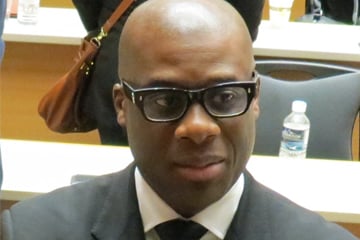Although the misconduct proceedings against Justice Donald McLeod around his involvement with a black advocacy group have been dismissed, his lawyer says the ordeal highlights the need for the legal community to “reconsider” and “revamp” judicial ethical principles.

McLeod, a judge on the Ontario court of justice in Brampton, was involved in the founding of the Federation of Black Canadians, after the shooting death of a young pregnant Black mother, Candice Bobb, galvanized many in the black community to organize and address issues such as mental health, gun violence, corrections, education, racism and other issues.
“It is fitting that the Judicial Council clearly recognized that this was not a case of misconduct: indeed that Justice McLeod as a role model in the Black community has an important continuing role to play in educating the public as to the challenges facing the vulnerable and marginalized, particularly Black young men and women,” said Mark Sandler who acted as McLeod’s lawyer during the proceedings, via email.
Sandler said in his submissions that “the justice system is not so fragile a flower that it would wilt as a result of the activities Justice McLeod engaged in.”
He told Legal Feeds on Friday that he would welcome the judiciary, the public and academia to come together and develop clearer judicial ethical principles, a need shown by McLeod’s case as well as the case of Ontario Superior Court Justice Patrick Smith, who also faced misconduct allegations for his taking an interim Dean of Law position at Lakehead University.
The issues surrounding Smith and McLeod’s cases “should never have been addressed in the context of misconduct allegations,” Sandler said.
“This a really big day in Black Canadian history in our country. And I think in the legal community, this will have different implications for the legal community and for the judicial community but for the African Canadian community we haven’t quite seen anything like this before,” says Saron Gebresellassi a Toronto-based lawyer who practises human rights law, employment law, insurance litigation and was a mayoral candidate in this year’s election.
“So it’s a victory for our community,” she says.
The fact that the complaint was made and the hearings took place, however, “really hurt the morale of our community,” she says. Gebresellassi adds she hopes McLeod continues his advocacy for Black Canadians, noting that the admiration for McLeod among his peers was demonstrated clearly in the number of people who showed up to the two day-long hearings on Nov. 30 and Dec. 4.
“He absolutely deserves to be celebrated and that’s why the community came in such big numbers,” she says.
Associate Chief Justice of the Ontario Court, Faith Finnestad, had lodged the complaint after McLeod met with her several times seeking advice on how his role in the FBC affected his role as a judge. McLeod had also sought advice from the Judicial Ethics Committee of the Ontario Court of Justice. Finnestad advised McLeod to end his involvement with the FBC but the ethics committee told him that as long as the group did not function as a lobbying organization and simply a “conduit of important information,” McLeod’s role with the FBC would square with his judicial duties.
The FBC had met with provincial and federal politicians, which was the substance of the complaint that McLeod had compromised the integrity, impartiality and independence of the judiciary and inappropriately used the power and prestige of judicial office to advance the interests of the FBC and lent his prestige to FBC fundraising.
During the OJC hearings, Sandler and presenter for the OJC Linda Rothstein analyzed the meetings with politicians to explore if McLeod, on behalf of the FBC, was doing more than educating lawmakers on the issues facing the Black community, if there activities amounted to lobbying for policy change and government funding.
The purpose of judicial conduct proceedings is remedial rather than punitive and a finding of misconduct should only be made when the judge behaved “so seriously contrary to judicial impartiality, integrity and independence” that the public has lost confidence both, that the judge can perform their duties, and in the general administration of justice, stated a summary of the matter from the OJC.
“Indeed, I will respectfully submit to you that these proceedings and a potential finding of misconduct against Justice McLeod can potentially undermine and diminish rather than enhance public confidence in the administration of justice,” said Sandler during the hearing on Nov. 30.
The panel concluded that while McLeod’s conduct was “incompatible with judicial office” it had not undermined that confidence. The problems identified by the FBC were “well-documented” and “recognized by Canadian courts,” and McLeod “acted in good faith, sought ethical advice and attempted to respect the limits that his judicial role imposed,” said the summary.
The OJC went on to say that the decision clarifies the issue judges being involved in advocacy and political activity, creating a boundary that judge’s must respect “however laudable their motives.”









